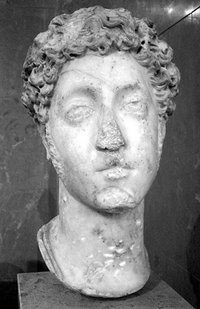Commodus
|
|
Marcus Aurelius Commodus Antoninus (originally Lucius Aelius Aurelius Commodus) (August 31, 161–December 31, 192 A.D.) was a Roman Emperor who ruled from 180 to 192 A.D. He is often considered to have been one of the worst Roman Emperors, in the caliber of Nero and Caligula, and his reign brought to a close the era of the "five good emperors".
Commodus was the son of the popular and successful Marcus Aurelius. He had a twin brother, Antoninus, who died when he was about four years old, and a sister Lucilla who was implicated in plots to overthrow him. He was made co-emperor in 177, during his father's lifetime; when he became sole emperor upon the death of his father in 180, it was at first seen as a hopeful sign by the people of the Roman Empire.
Nevertheless, as generous and magnanimous as his father was, Commodus turned out to be just the opposite, with the sole exception being that he stopped a persecution of Christians started by his father. Commodus is often thought to have been insane, and he was certainly given to excess. He began his reign by making an unfavorable peace treaty with the Germanic tribe of the Marcomanni, who had been at war with Marcus Aurelius. Later, Commodus would wage wars of his own against the Germans, often winning partial victories and then claiming honors for them in the Roman Senate.
Commodus also had a passion for gladiatoral combat, which he took so far as to take to the arena himself, dressed as a gladiator. This was considered scandalous by the people of Rome, who regarded gladiators as one of the lowest rungs of society. Commodus entered the arena fully armed and fought hapless opponents armed only with wooden weapons. Dressed as the Greek hero Hercules, Commodus claimed to have slain 12,000 men in gladiatoral combat. For each appearance in the arena, he charged the city of Rome a million sesterces.
Commodus' instability was not limited to this, however. He once had the inhabitants of a city massacred because one of them looked at him with what Commodus thought was an unfriendly glance. He demanded to be worshipped as a god, and he neglected the matters of state while dallying with a harem of some 300 women and young boys. He appointed his cronies to administer the empire, and shared in the money these men stole. Numerous ancient authories also record rumors of Commodus' incestuous relationship with his sister.
In 190, a part of the city of Rome burned, and Commodus took the opportunity to "re-found" the city of Rome in his own honor, as Colonia Commodiana. The months of the calendar were all renamed in his honor (Lucius, Aelius, Aurelius, Commodus, Augustus, Herculeus, Romanus, Exsuperatorius, Amazonius, Invictus, Felix, Pius [1] (http://www.roman-emperors.org/commod.htm)), and the senate was renamed as the Commodian Fortunate Senate. The army became known as the Commodian Army.
A year later, Commodus was strangled in his sleep (by the wrestler Narcissus, a partial model for Maximus Decimus Meridius of the movie Gladiator), a day before he planned to march into the Senate dressed as a gladiator to take office as a consul. Some historical accounts record his death during a gladiatorial duel in the colosseum. Upon his death, the Senate passed damnatio memoriae on him and restored the proper name to the city of Rome and its institutions. However, in 195, the emperor Septimius Severus, trying to gain favor with the family of Marcus Aurelius, rehabilitated the memory of Commodus and had the Senate deify him.
The popular movies The Fall of the Roman Empire (1964) and Gladiator (2000) were loosely based on the career of the emperor Commodus, although they should not be taken as accurate historical depictions of his life.
External links
Primary sources
- Historia Augusta: Life of Commodus (http://penelope.uchicago.edu/Thayer/E/Roman/Texts/Historia_Augusta/Commodus*.html)
Secondary material
- Commodus (http://www.roman-emperors.org/commod.htm) entry at De Imperatoribus Romanis

